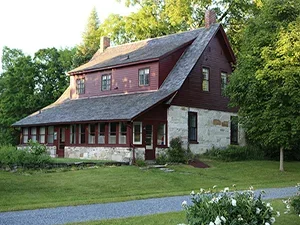Robert Frost Stone House Museum Receives Vermont Economic Recovery Grant
The Robert Frost Stone House Museum at Bennington College has received a Vermont Economic Recovery Grant of $4,581.50 to support the Museum’s economic recovery from the COVID-19 pandemic.

The Vermont Economic Recovery Grant was administered by the Vermont Arts Council, with funding from the Commerce and Community Development Agency.
“We are so thankful for these grant funds, which help offset the losses we have sustained during a limited season,” said Erin McKenny, Director of the Robert Frost Stone House Museum. “It was important to us to open the Museum in some capacity this year so that visitors could experience the life and poetry of Robert Frost at a time when it is needed more than ever.”
A Community Resource During a Challenging Time
The Robert Frost Stone House Museum’s six-month season typically runs from May 1 through October 31; however, the COVID-19 pandemic shortened this year’s visiting opportunities. While the Museum safely reopened to the public on July 23—with reduced hours and capacity limits to comply with public health and safety best practices—COVID-19 limitations have curtailed the Museum’s usual revenue from admissions and tourism.
Likewise, the Museum usually hosts a range of public programs, including concerts and workshops, which also support the Museum through tickets and donations. Due to COVID-19, the vast majority of this regular programming has been cancelled. This year’s in-person programming has been limited in capacity and held outdoors.
Despite these challenges, the Museum remains committed to the needs of its community and local residents. Responding to the dire issue of local food insecurity—which has been exacerbated by the pandemic due to unemployment and the closure of schools—the Museum has partnered with Bennington College’s Center for the Advancement of Public Action (CAPA), local government agencies, and a range of nonprofit organizations to promote gardening, educational workshops, and sharing of harvests. To support these efforts, the Museum presented a free series of five webinars on resilience gardening, which garnered nearly 500 registrations total.
The Museum has also served as the collection site for the new Grow a Row program, where local residents have shared produce from their gardens with those in need. Since the beginning of the summer, 15 local gardeners have brought vegetables, herbs, and apples to the Museum, which have been delivered weekly to local food pantries. The Museum has also begun partnering with Grateful Hearts, an organization that is processing apples gleaned from the Bennington College campus and other area growers into frozen desserts that will be delivered to food distribution programs.
Additionally, the Museum also helped coordinate a new gardening program for residents of two local low-income housing developments: Willow Brook and Beech Court. Gardening tools and plants were provided for residents, allowing them to have gardens or container gardens for the first time, and making a true difference in residents’ lives.